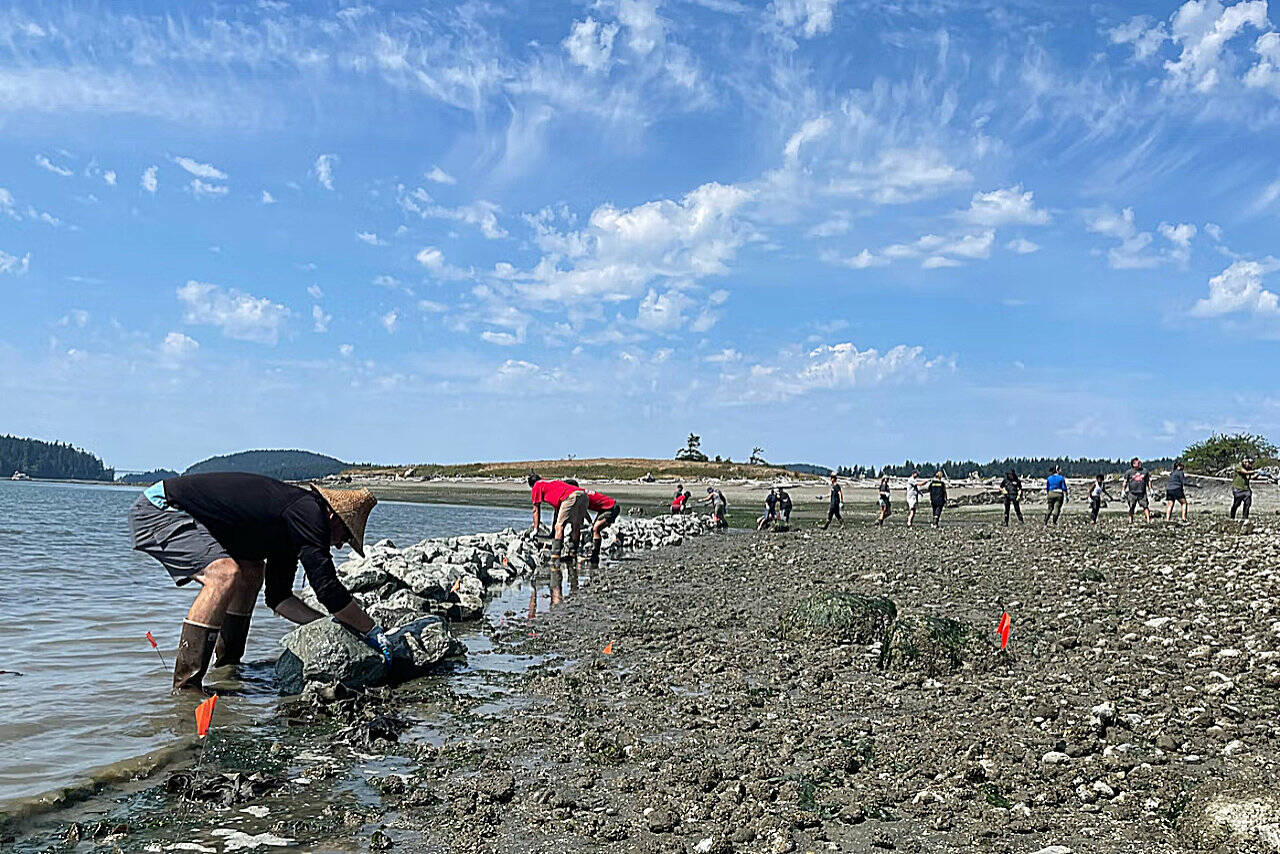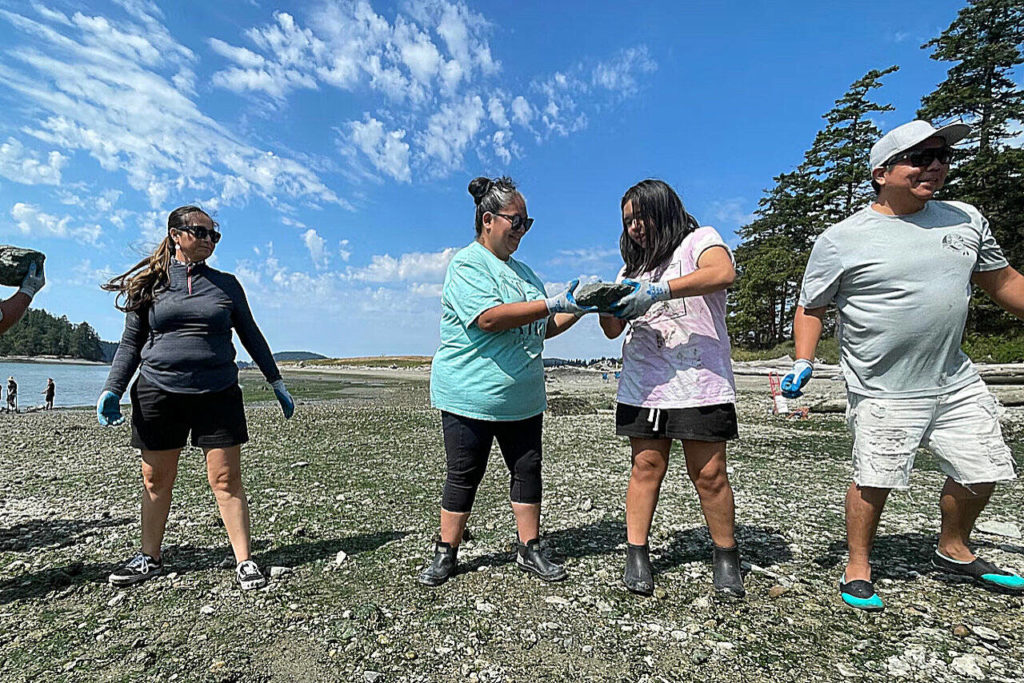By the time you read this story, what it describes will probably have disappeared beneath the waves.
That’s how it was meant to be — and how it used to be.
Since time immemorial, as the saying goes, people in what is now Washington and British Columbia farmed the sea with a type of environmental engineering called clam gardening.
Around the time Europeans showed up here, the practice was lost.
“It was stolen from us,” Swinomish Tribal Senator Alana Quintasket told KUOW. “All of our teachings, all of our practices, our connections to this place, our connections to each other, our connections to all living things was stolen from us with settler colonialism.”
Quintasket stood in the mud where Skagit Bay becomes Kiket Island, west of La Conner in Skagit County.
“We’re working hard to restore these practices, to bring back these teachings, and to restore our relationships,” she said.
A few dozen people in work gloves and rubber boots gathered on that small island, during one of the lowest tides of the year.
“We are starting to build the rock wall for our clam garden,” Quintasket said.
It’s believed that a clam garden — a traditional, Indigenous way of boosting shellfish production — hasn’t been built in the United States for close to 200 years.
Rock by rock, this muddy gathering is changing that.
As beefy men strain to push wagons of boulders through the mud, adults and children form a long line down to the water’s edge. Each link in the human chain twists at the waist to hand a heavy rock to the next person until it nears the nascent wall. Conversation and laughter abound.
“We’re passing rocks,” said Marcia Julius of La Conner, a Swinomish Tribe historic preservationist and tribal member. “This seems to make more sense than all of us going back and forth.”
If you’ve ever heard the tribal saying, “when the tide goes out, the table’s set,” then you have a sense of how important shellfish are to Native cultures in this part of the world.
“It’s definitely a part of who we are,” said Julius, who was helping build the wall with her three kids. “Our lives work better when we’re able to eat our traditional foods.”
Gradually, 33 tons of hand-carried rocks coalesce into a wall about knee high and nearly 200 feet long. It arcs along a contour line 2 feet below the typical low tide. Most of the time, the wall will be submerged, invisible to visitors to the Kukutali Preserve, co-managed by the Swinomish Tribe and Washington State Parks.
Over time, the sturdy but porous structure should capture sediment on its upland side and expand the shallow, gently sloping habitat for things like butter clams and littleneck clams.
As with any backyard garden, continual tending — in this case, by clearing rocks and algae from the clam-growing areas and digging into the sediment with sticks to aerate it — will be part of ensuring a productive harvest.
Clam gardens grow four times more butter clams and twice as many littleneck clams as unterraced beaches do, according to a study of dozens of ancient clam gardens around Quadra Island, British Columbia. Young littleneck clams planted in the centuries-old terraces grew nearly twice as fast, making more local protein available to shellfish harvesters.
Michael Wilson of the Pauquachin Nation on Vancouver Island has come down from Canada to help.
“Seaweed, crabs, clams, oysters, everything comes right in behind his wall, and it gets protected, and it’ll get more nutrition than when there’s no wall here,” Wilson said.
In British Columbia, a few First Nations, as Indigenous groups are known there, have rebuilt clam gardens, traces of which had survived centuries of disuse.
“We wanted to have as much food as we can for our people,” Wilson said.
Members of those First Nations are sharing their expertise and muscle across the invisible, watery border with Washington state.
“These teachings have been with us for thousands of years. Government didn’t want us to do this,” said Woody Underwood, visiting from the Tsawout Nation on Vancouver Island.
Carbon dating has shown some clam gardens near Vancouver Island to be as old as Egyptian pyramids: 3,500 years or more.
Between forced relocation and other human rights abuses, Canadian governments almost stamped out this ancient practice.
“In Canada, we were colonized by the plow,” Underwood said. “They wanted to turn us into farmers.”
Underwood says it’s been a long haul, but Coast Salish people on both sides of the border are bouncing back.
“So seeing us here today, guess what? We didn’t only survive, but we’re thriving,” he said.
“I’m just grateful my kids were able to be here and to witness and be a part of what will be here for generations to come,” Julius said.
How soon all the rock hauling on Kiket Island will benefit Swinomish diets is unclear.
It takes a butter clam about three years to grow to harvestable size, according to Western Washington University marine ecologist and Samish Nation member Marco Hatch.
“What we’re doing here is something that hasn’t been done in living memory, which is build a clam garden from scratch,” Hatch said. “So we don’t really know how long does it take for those sediments to fill in or what that’s going to look like.”
On the beach, the long chain of rock passers looks like an old-timey bucket brigade for fighting a fire.
But it’s more like a boulder brigade for fighting climate change.
Crushed shell bits are expected to wash in and pile up behind the wall.
They can locally neutralize some of carbon dioxide that’s making sea water more acidic and less hospitable to shellfish as well as overheating the planet.
“We’re supporting our relatives of the sea in a time of crisis,” said Quintasket, the Swinomish senator. “It’s not just climate change anymore. We are in crisis mode, and this is just a little bit of work that we can do to support their home to make sure that they’re surviving with us.”
While the ecological benefits might take years to materialize, the human benefits have already begun.
“Our people getting to know each other is as important as the restoration work we do,” Underwood said, “because we’re restoring our culture.”
Coast Salish people were cut off from many of their relatives and natural resources after the Oregon Treaty of 1846 drew a zigzag U.S.-Canada boundary midway between Vancouver Island and the North American mainland.
“It’s much more than just moving rocks and building a wall. This is bringing back who we are as Coast Salish people, as indigenous people to this place,” Quintasket said.
Quintasket says one of the biggest benefits of the muddy manual labor has been getting to work with tribal relatives from the other side of that saltwater border.
“It’s brought nations together that haven’t been brought together in generations, you know?” she said.
Some walls divide communities. This one is bringing them together.
Talk to us
> Give us your news tips.
> Send us a letter to the editor.
> More Herald contact information.


























